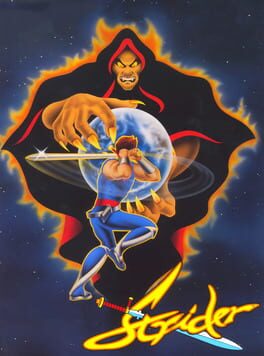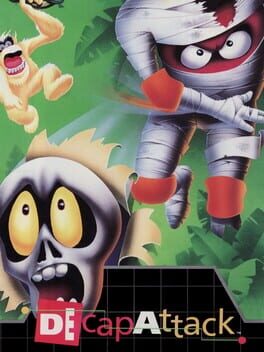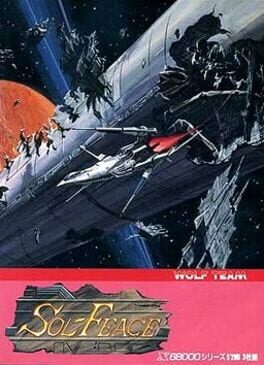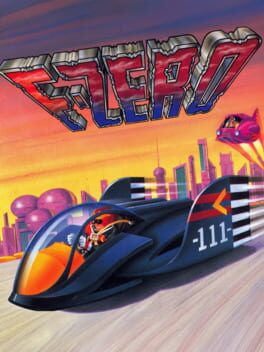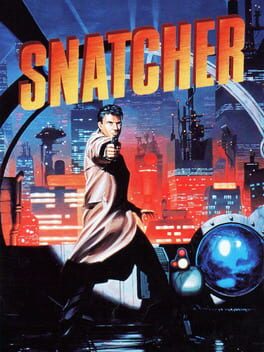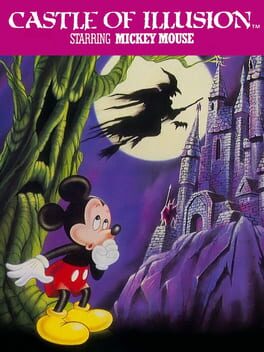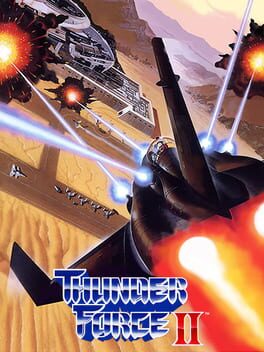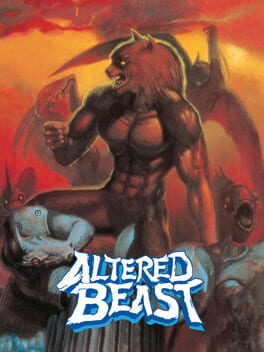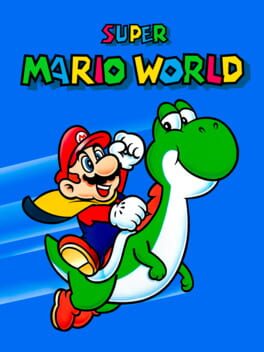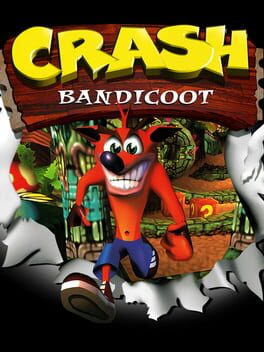vikdarkbomb
1989
1990
You may not find much depth to the gameplay, but Decap Attack's artstyle is unique to why the game is an enjoyable time and underrated to a degree. Audio is one of the best parts of the game, with unique tunes in most levels that are accompanied by wacky character designs. It is also not much of a time investment being less than 3 hours at the most. All the worlds are unique in their own right, barring the repetitive enemies in some levels. Platforming is easy, if your only aim is to finish the level, but exploring every part of the level proves to be a challenge. It is also nice how there is a sense of verticality, allowing you to have multiple paths to the same finish point. Unfortunately, the boss fights in spite of being well made all have similar patterns with an occasional gimmick every 1-2 worlds despite their unique designs. But, these minor gripes shouldn't stop you from playing an underrated and fun Genesis game.
1990
A short but serviceable SHMUP. There isn't thing much unique to this game so I can't help but feel it is a bit trite. It also thankfully doesn't rely on cheap memorization gimmicks or bad controls. The shooting and hit detection are satisfactory. Note that there is a noticeable difficulty spike on the second to last boss and the last level and after the ending there isn't much to do other than Hi-Scores.
PS: The game is called Sol-Deace, not Sol-Feace when looking for English copies.
PS: The game is called Sol-Deace, not Sol-Feace when looking for English copies.
1990
If you want to see where the F-Zero series started, this may be interesting, but if this is your first game I don't see it convincing you to play the other ones. Only two vehicles are useful (the Stingray and Goldenfox -latter for only the third league) and the tracks can get repetitive as you go through all of them. The AI is always rubberbanded so even a simple mistake will mean they pass you even if you have a big lead. They are also aggressive, to an uncessary extent. They are willing to crash you and themselves just so you fall behind. This is most noticeable in the final league, where track design is frustrating and the AI makes it even worse, the final track in that league is the only redeeming part of it. Even when you master the movement, there is not much else you can do with it. The audio is however nice. The soundtrack apart from a track or two is forgettable but the vehicles themselves and crashing and turning all sound nice. The graphics for a SNES Launch Title isn't too bad, and gives the nice illusion of "3D", but some wide turns suffer from a lack of draw distance. For all it's flaws though, when the game works on a good track, it is fun to play for a while but nothing more. That doesn't make it bad by any means, but don't expect much out of it.
1992
Invasion of the Body Snatchers with Terminators in Blade Runner. The result may seem derivative but Snatcher is anything but. In fact, Snatcher is one of the best VN's available on the 4th Gen systems. It is confident in it's inspirations but capable enough to bring it's own spin to the genre, albeit in a different medium.
The game has a slow start, taking a while to set the characters and settings into place. Sometimes figuring what to do in investigations is frustrating. However, the story quickly picks up and stays as such until the end once things get more complex. It's also inter-spliced by shooting galleries. Nothing special, but it is a nice break. The issue with these galleries is they are ramped up oddly in the end and feel more filler than natural. Snatcher's writing is punchy but wordy yet it is the best part about the game. Although the game was lauded for being important in developing maturity in video gaming storytelling, age has not made the story any less enjoyable.
The artstyle is reminiscent of a cartoon, but the direction is given enough personality to be unique. The audio is the best part of the presentation, with a wide-ranging soundtrack that always fits the scenarios you come across. The introduction in particular is a stand-out. In terms of gameplay, there is nothing complex there. It plays out like any other visual novel but it is not the central focus of the game. However the game can be linear with how you have to look at and investigate scenes. I got lost once or twice because I didn't do something in a particular order, so it is not a bad idea to have a guide to look at. It seems that the developers were prepared for this as repeating actions once or twice gives unique dialogues that all have the same meaning.
The story isn't afraid of asking unique questions, as with many Kojima titles. It explores ideas of contention, AI and others. Snatcher is perhaps one of Kojima's best works in regards to writing as the game is tight-knit with everything coming into place conveniently and eloquently. The third act feels a bit rushed, however given the budget reasons behind it they did well with what they had. Characters are well-realised albeit a bit on the nose with where they are based on. The voice acting is also a nice addition, and doesn't feel that cheap with decent performances. The tone is also well-kept with the game capable of seamlessly moving within serious or zany within a scene or two without it being unnatural. In one scene, you'll be investigating a junkie's room but only a few minutes later you'll be having the unique food of Neo Kobe City. The game is personable even in it's smaller moments.
Unfortunately, the best version to play (the Sega CD) is expensive now, costing 400-500$ for a decent copy, so you are better off emulating. There may be some mild censors, but it's nothing major, mainly nudity. This is the only western version of the game with voice acting and a third act, which other versions lack. But it shouldn't stop you from playing one of Sega CD's best titles.
The game has a slow start, taking a while to set the characters and settings into place. Sometimes figuring what to do in investigations is frustrating. However, the story quickly picks up and stays as such until the end once things get more complex. It's also inter-spliced by shooting galleries. Nothing special, but it is a nice break. The issue with these galleries is they are ramped up oddly in the end and feel more filler than natural. Snatcher's writing is punchy but wordy yet it is the best part about the game. Although the game was lauded for being important in developing maturity in video gaming storytelling, age has not made the story any less enjoyable.
The artstyle is reminiscent of a cartoon, but the direction is given enough personality to be unique. The audio is the best part of the presentation, with a wide-ranging soundtrack that always fits the scenarios you come across. The introduction in particular is a stand-out. In terms of gameplay, there is nothing complex there. It plays out like any other visual novel but it is not the central focus of the game. However the game can be linear with how you have to look at and investigate scenes. I got lost once or twice because I didn't do something in a particular order, so it is not a bad idea to have a guide to look at. It seems that the developers were prepared for this as repeating actions once or twice gives unique dialogues that all have the same meaning.
The story isn't afraid of asking unique questions, as with many Kojima titles. It explores ideas of contention, AI and others. Snatcher is perhaps one of Kojima's best works in regards to writing as the game is tight-knit with everything coming into place conveniently and eloquently. The third act feels a bit rushed, however given the budget reasons behind it they did well with what they had. Characters are well-realised albeit a bit on the nose with where they are based on. The voice acting is also a nice addition, and doesn't feel that cheap with decent performances. The tone is also well-kept with the game capable of seamlessly moving within serious or zany within a scene or two without it being unnatural. In one scene, you'll be investigating a junkie's room but only a few minutes later you'll be having the unique food of Neo Kobe City. The game is personable even in it's smaller moments.
Unfortunately, the best version to play (the Sega CD) is expensive now, costing 400-500$ for a decent copy, so you are better off emulating. There may be some mild censors, but it's nothing major, mainly nudity. This is the only western version of the game with voice acting and a third act, which other versions lack. But it shouldn't stop you from playing one of Sega CD's best titles.
A very short but also very enjoyable platformer. All the sprite work is well done and the each level has a distinct setting. The game-play is well done typical platforming but sometimes hit detection can be a bit off. Enemies are however a bit repetitive up until the last level. My only gripe is that I wish the game would have been longer. There's no reason not to try this game, unless you think you're too old for Mickey Mouse.
1989
A pretty tough Shoot 'em Up. The levels are varied, the variation in environments are nice, but the difficulty is sharp. The main thing holding this game back is the lack of visual distinction. Most enemies tend to blend in with background along their bullets so it's hard to keep track. Also the sense of direction in the isometric levels is severely lacking. It has dated quite a bit, but given it's an earlier Genesis title its not as bad as you think.
1988
1990
In the grand scheme of things, Super Mario World although a bit overrated, is a ton of fun if you go and seek it. If you only rush through only seeking to finish the game, you will be sorely disappointed, but if you try and explore everything the game has to offer, you will find a great experience.
The game looks good for a SNES launch title and has even aged well today. This is thanks to a colourful, vibrant, and pleasant artstyle. Environments are clear and simple to understand. You could show someone a random screenshot of a level and they could tell you the world (maybe even the level) due to how recognisable everything is. The enemies are easy to read as well with defined pathing and movement. The audio has suitable tunes, satisfying hits sounds, identifiable losses in power-up or if one is occurring at the moment, and there is various small subtleties here and there if you look for it (a noticeable one being riding Yoshi adds a bit more flair as you go through a level). Near the end-game, you'll also have the option to change how the game looks entirely. Although this is a nice touch, I prefer sticking to the original look. From an audio-visual perspective, the game holds up, and in comparison to their late NES contemporaries, is a marked improvement.
Gameplay wise is where I have some qualms. Most of your deaths are justified, however the hitboxes can be a bit unfair, such as being even slightly above a spiked shell will kill you. At first, it's not a big deal, but as you encounter these enemies along with some other ones which share the same quirks (ie fishes), it is annoying. Boss fights are really easy and repeated. You'll be having 3-4 same boss types, but Bowser is a bit different and tricky if you don't know what you're doing. Fortunately, it is not the bulk of the game so triteness is seldom felt. The far majority of levels are well made, mixing precise movements, somewhat open areas, and the rare auto-scroller (which I did not enjoy as it would slow down momentum for no reason). The good thing is that the controls are able to keep up, allowing you to have much needed freedom to movement, and backtracking if needed. The controls make platforming incredibly sublime. Getting used to the fundamentals and then messing around with them in levels led me to many failures but also the occassional spark of joy when something worked. The game encourages it as-well and getting to the point of mastery where running through levels becomes a ballet is incredibly rewarding. As this was my first Mario game, I did suck a bit initially, but there is a nice difficulty scale to it all. Completing the game (ie doing the least exits to beat Bowser) is also a good deal of joy, but I was severely underwhelmed doing that only. There was a lack of challenge to it and it was soured even more so because the occasional level would toy around with the mechanics in fun ways, almost being a tease. But, this toying is brought to the extreme once you reach the special levels. Abusing all the mechanics here are a blast and the highlight of my playthrough. This new experience makes going back to old levels retroactively more replayable as honing your skills gives some incentive to repeat past levels beating your time. It is a game that begs to be 100%ed, not only for these special levels but also the neat secret here and there. The secrets are fun and enjoyable to discover, yet sometimes the over-world or even the levels are in-able to indicate whether I really did everything I was supposed to in a level or not. In the end of getting 94 exits, my last half hour was dedicated to trying to find what the last exit was, only to realise it was in a ghost house and a star world level I didn't finish normally, yet the game gives no way of indicating such things. Essentially, the gameplay is near-perfect, but minor nitpicks which are repeated consistently become larger issues. Mountains out of mole-hills, if you will.
Super Mario World was a great time, but some minor nitpicks can get frustrating as you play through the game. To a degree, it is a bit over-hyped, and much of it's praise is rightfully based on the improvement it made to SMB3. For what it's worth Nintendo nailed the launch of the SNES with not only an entertaining platforming romp but one of the platform's best titles.
The game looks good for a SNES launch title and has even aged well today. This is thanks to a colourful, vibrant, and pleasant artstyle. Environments are clear and simple to understand. You could show someone a random screenshot of a level and they could tell you the world (maybe even the level) due to how recognisable everything is. The enemies are easy to read as well with defined pathing and movement. The audio has suitable tunes, satisfying hits sounds, identifiable losses in power-up or if one is occurring at the moment, and there is various small subtleties here and there if you look for it (a noticeable one being riding Yoshi adds a bit more flair as you go through a level). Near the end-game, you'll also have the option to change how the game looks entirely. Although this is a nice touch, I prefer sticking to the original look. From an audio-visual perspective, the game holds up, and in comparison to their late NES contemporaries, is a marked improvement.
Gameplay wise is where I have some qualms. Most of your deaths are justified, however the hitboxes can be a bit unfair, such as being even slightly above a spiked shell will kill you. At first, it's not a big deal, but as you encounter these enemies along with some other ones which share the same quirks (ie fishes), it is annoying. Boss fights are really easy and repeated. You'll be having 3-4 same boss types, but Bowser is a bit different and tricky if you don't know what you're doing. Fortunately, it is not the bulk of the game so triteness is seldom felt. The far majority of levels are well made, mixing precise movements, somewhat open areas, and the rare auto-scroller (which I did not enjoy as it would slow down momentum for no reason). The good thing is that the controls are able to keep up, allowing you to have much needed freedom to movement, and backtracking if needed. The controls make platforming incredibly sublime. Getting used to the fundamentals and then messing around with them in levels led me to many failures but also the occassional spark of joy when something worked. The game encourages it as-well and getting to the point of mastery where running through levels becomes a ballet is incredibly rewarding. As this was my first Mario game, I did suck a bit initially, but there is a nice difficulty scale to it all. Completing the game (ie doing the least exits to beat Bowser) is also a good deal of joy, but I was severely underwhelmed doing that only. There was a lack of challenge to it and it was soured even more so because the occasional level would toy around with the mechanics in fun ways, almost being a tease. But, this toying is brought to the extreme once you reach the special levels. Abusing all the mechanics here are a blast and the highlight of my playthrough. This new experience makes going back to old levels retroactively more replayable as honing your skills gives some incentive to repeat past levels beating your time. It is a game that begs to be 100%ed, not only for these special levels but also the neat secret here and there. The secrets are fun and enjoyable to discover, yet sometimes the over-world or even the levels are in-able to indicate whether I really did everything I was supposed to in a level or not. In the end of getting 94 exits, my last half hour was dedicated to trying to find what the last exit was, only to realise it was in a ghost house and a star world level I didn't finish normally, yet the game gives no way of indicating such things. Essentially, the gameplay is near-perfect, but minor nitpicks which are repeated consistently become larger issues. Mountains out of mole-hills, if you will.
Super Mario World was a great time, but some minor nitpicks can get frustrating as you play through the game. To a degree, it is a bit over-hyped, and much of it's praise is rightfully based on the improvement it made to SMB3. For what it's worth Nintendo nailed the launch of the SNES with not only an entertaining platforming romp but one of the platform's best titles.
1996
Crash Bandicoot is a pretty good platformer, especially for it's time. In comparison to SM64, which takes a different approach where you have a freedom of control and sometimes even room for error, Crash is a lot more linear and precise, and it what makes it really enjoyable.
Most of the levels require some patience, where you need to take your time and get through stages in an exact fashion. In the beginning, you will mess up way too often, missing maybe a inch on one jump or a second before a plant eats you. It's a bit frustrating yes, but as you go across the levels you'll get better at it, and your skills will naturally improve. There is some gimmick levels sprinkled into the game (boulders and riding a hog) but they don't overstay their welcome. Even with these repetitions, each stage has a slight twist to it, or is amped up in its difficulty. Every way you can platform is introduced in a supposedly easy way, but testing it is where the true fun lines. For instance there are various "bridge" levels where you need to jump across the walkways on a bridge. The first level is fine at first, with a few platforms falling if you land on them. Then ice platforms and hogs start appearing, the hog in particular forcing you to start moving if he's nearby. In the next two levels, you need to use the back of turtles to make it precisely across the level, and need to also recognise when some falling platforms aren't the best to land on, along with the previous conditions. Once you finish the game and start collecting the gems for the true ending (which you need 100% for), the first few levels you struggled with will be a breeze, and it makes the gameplay satisfying. Replaying the third level, an introduction to the 2D-inclined stages, which took me 15 minutes to beat before, now takes maybe 3 minutes since I rarely get hit and the Aku-Aku (tokens that give you one more hit resistance) are given generously. If you understand the mechanics, you can beat that level being practically invincible the whole time. Essentially, Crash Bandicoot rewards patience and learning the mechanics to really master the game, and it is not that difficult if you go along with that.
The story is pretty bare-bones, but the variations in the environment hold up well, even at it's internal resolution. First you start off in the jungle, then you venture into ancient ruins, temples, bridges in the sky, abandoned castles, and industrial areas. The audio is nice also, with good ambient and some catchy tunes every few levels or so. The jungle levels have alot of fauna making noise, and some chirping. The industrial areas have music that is a bit more stark or robotic, while the boss fights have tunes that compliment their respective boss. It's less of the focus compared to the visuals, but it does add to them in a sometimes subtle, other times exaggerated way. The boss fights themselves are easy if you get the patterns, but their art direction and Looney Tunes-inspired look add some enjoyment to them even if they are a bit predictable.
However, the game does suffer from some QoL issues. Every time you die, the boxes you smashed in that level are reset, meaning you have to go back and collect the previous ones before your checkpoint, which may be impossible depending on the obstacles. Saving can only be done after a bonus round, or getting a gem, and sometimes only beating a boss. But a password system is in place if you want to avoid this. Also, the camera is not that great in some levels (mainly the ones in temple ruins) where it's difficult to know if you can make a jump or not. Hitboxes may also be a bit of an issue depending on the timing you make with your jump or spin. Also, Crash has some subtle ways of moving that is a hard to understand at first, like the spin attack making him slightly move or cancel the height on his jump. In those cases, you depend on his shadow to know where you will really land. But, the game does have generous Coyote time, so even if you do mess up, if your wits are good enough you can avoid it. Also, it doesn't really make the controls bad, in fact it is the opposite. Crash moves exactly how you make him, and that is due to the fact that the game does not support analog (at leas the original release doesn't).
The best way to remedy the biggest culprit (box reseting) is to emulate it IMO. Keeping a save state at each checkpoint and start of bonus round is good enough to retain an authentic experience without having to deal with unnecessary hassles like box reseting. If your a purist however, it can definitely turn you off from really beating the game, and the same can be true if you're coming back from Crash 2 or Crash 3. If you're not, i'd still recommend playing the original game, as the physics were changed in N. Sane trilogy and the colors and artstyle were a bit toned down, and the audio sounds a bit tinny comapred to the original. It's not hard to find either, depending on if you want to play the PSN Version, PS1 Disc, or emulate it (which is easy to run even on extreme budget hardware)
In general, Crash Bandicoot is a stellar platformer, but some minor inconvenience, and the occasional boss fight may prove to be an annoyance they do not sell the game short of being a fun time. Naughty Dog easily achieved their point of making a characteristic, approachable platformer that is tricky to master.
Most of the levels require some patience, where you need to take your time and get through stages in an exact fashion. In the beginning, you will mess up way too often, missing maybe a inch on one jump or a second before a plant eats you. It's a bit frustrating yes, but as you go across the levels you'll get better at it, and your skills will naturally improve. There is some gimmick levels sprinkled into the game (boulders and riding a hog) but they don't overstay their welcome. Even with these repetitions, each stage has a slight twist to it, or is amped up in its difficulty. Every way you can platform is introduced in a supposedly easy way, but testing it is where the true fun lines. For instance there are various "bridge" levels where you need to jump across the walkways on a bridge. The first level is fine at first, with a few platforms falling if you land on them. Then ice platforms and hogs start appearing, the hog in particular forcing you to start moving if he's nearby. In the next two levels, you need to use the back of turtles to make it precisely across the level, and need to also recognise when some falling platforms aren't the best to land on, along with the previous conditions. Once you finish the game and start collecting the gems for the true ending (which you need 100% for), the first few levels you struggled with will be a breeze, and it makes the gameplay satisfying. Replaying the third level, an introduction to the 2D-inclined stages, which took me 15 minutes to beat before, now takes maybe 3 minutes since I rarely get hit and the Aku-Aku (tokens that give you one more hit resistance) are given generously. If you understand the mechanics, you can beat that level being practically invincible the whole time. Essentially, Crash Bandicoot rewards patience and learning the mechanics to really master the game, and it is not that difficult if you go along with that.
The story is pretty bare-bones, but the variations in the environment hold up well, even at it's internal resolution. First you start off in the jungle, then you venture into ancient ruins, temples, bridges in the sky, abandoned castles, and industrial areas. The audio is nice also, with good ambient and some catchy tunes every few levels or so. The jungle levels have alot of fauna making noise, and some chirping. The industrial areas have music that is a bit more stark or robotic, while the boss fights have tunes that compliment their respective boss. It's less of the focus compared to the visuals, but it does add to them in a sometimes subtle, other times exaggerated way. The boss fights themselves are easy if you get the patterns, but their art direction and Looney Tunes-inspired look add some enjoyment to them even if they are a bit predictable.
However, the game does suffer from some QoL issues. Every time you die, the boxes you smashed in that level are reset, meaning you have to go back and collect the previous ones before your checkpoint, which may be impossible depending on the obstacles. Saving can only be done after a bonus round, or getting a gem, and sometimes only beating a boss. But a password system is in place if you want to avoid this. Also, the camera is not that great in some levels (mainly the ones in temple ruins) where it's difficult to know if you can make a jump or not. Hitboxes may also be a bit of an issue depending on the timing you make with your jump or spin. Also, Crash has some subtle ways of moving that is a hard to understand at first, like the spin attack making him slightly move or cancel the height on his jump. In those cases, you depend on his shadow to know where you will really land. But, the game does have generous Coyote time, so even if you do mess up, if your wits are good enough you can avoid it. Also, it doesn't really make the controls bad, in fact it is the opposite. Crash moves exactly how you make him, and that is due to the fact that the game does not support analog (at leas the original release doesn't).
The best way to remedy the biggest culprit (box reseting) is to emulate it IMO. Keeping a save state at each checkpoint and start of bonus round is good enough to retain an authentic experience without having to deal with unnecessary hassles like box reseting. If your a purist however, it can definitely turn you off from really beating the game, and the same can be true if you're coming back from Crash 2 or Crash 3. If you're not, i'd still recommend playing the original game, as the physics were changed in N. Sane trilogy and the colors and artstyle were a bit toned down, and the audio sounds a bit tinny comapred to the original. It's not hard to find either, depending on if you want to play the PSN Version, PS1 Disc, or emulate it (which is easy to run even on extreme budget hardware)
In general, Crash Bandicoot is a stellar platformer, but some minor inconvenience, and the occasional boss fight may prove to be an annoyance they do not sell the game short of being a fun time. Naughty Dog easily achieved their point of making a characteristic, approachable platformer that is tricky to master.
